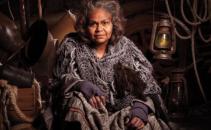 120087299346804937.jpg
120087299346804937.jpg
 120087299346804937.jpg
120087299346804937.jpg
'Bertolt Brecht's epic morality tale about the ravages of war is given a unique twist by Queensland Theatre Company Artistic Director Wesley Enoch and Paula Nazarski in a dazzling new translation.
Instead of the 'Thirty Years' War of 1600s Europe, this near-future incarnation of the age-old story is set against the bleak backdrop of a post-apocalyptic desert where Mad Max might be at home - an Australia ravaged by devastating conflict, where life is cheap but business is still business. Ursula Yovich is the titular canteen-wagon mistress, shrewdly driving hard bargains as she shepherds her brood of three through this unforgiving, harsh wilderness. With an all-Indigenous cast, this fresh spin on Brecht's play delicately folds in themes of land ownership, the impact of mining and the stolen generation.' (Source: QPAC website www.qpac.com.au)
'This article investigates the crucial role of Brechtian aesthetics in representing the voice of Aboriginal Australians. It examines the theatre of Wesley Enoch, an Aboriginal Australian director and playwright, and argues that Enoch’s 2013 adaptation of Bertolt Brecht’s Mother Courage and Her Children, performed at the Queensland Theatre Company, Brisbane, formed an instance of resistance against epistemic hegemony. The first part of the article examines the device of the heckler, central to the writings of Australian Aboriginals, by focusing on Kevin Gilbert’s The Cherry Pickers (1988) and shows how the device functions to articulate the peripheral voices of the Aboriginal Australians. The second part demonstrates how Enoch employed the heckler trope through his dramaturgy to protest against the Australian nation state. Broadly, it illustrates how Enoch’s production used Aboriginal aesthetics to voice Aborigines’ challenge to established norms, an act that remained independent of Brechtian theatre’s previous uses in the Australian context.' (Publication abstract)
'A resonant moment in contemporary times to restage Brecht's famous anti-war play.'
'Eleanor Hogan reviews Warwick Thornton’s film installation, Mother Courage'